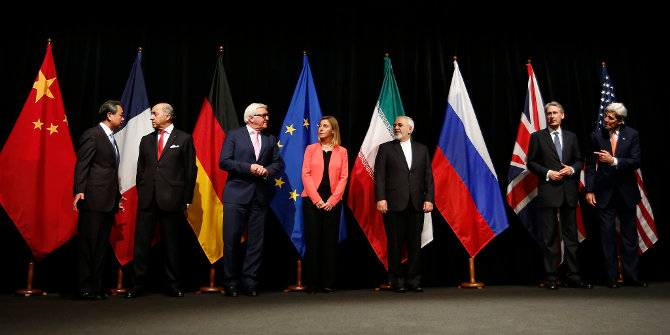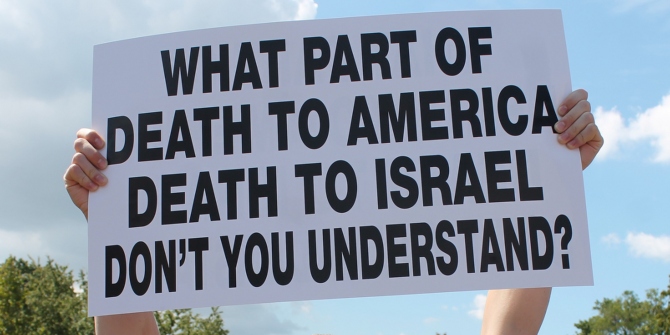 On Tuesday, President Obama announced that after nearly two years of negotiations, the United Nations’ P5+1 group had reached an agreement with Iran which limits the country’s nuclear activity in exchange for the lifting of sanctions. Bryan R. Gibson argues that the deal is a win for the US, Iran and Israel. He writes that resolving the Iranian nuclear question aligns perfectly with America’s strategic objectives for the region, and opens the door for cooperation with Iran on important regional issues. While Iranian leaders now face the challenge of selling deal to Iranian public as a victory, the deal will give the country desperately needed relief from sanctions, and the chance for new investment. For Israel, he writes, despite the concerns of the country’s leaders, any reduction of the threat of an Iranian nuclear weapon corresponds to an improvement in its security.
On Tuesday, President Obama announced that after nearly two years of negotiations, the United Nations’ P5+1 group had reached an agreement with Iran which limits the country’s nuclear activity in exchange for the lifting of sanctions. Bryan R. Gibson argues that the deal is a win for the US, Iran and Israel. He writes that resolving the Iranian nuclear question aligns perfectly with America’s strategic objectives for the region, and opens the door for cooperation with Iran on important regional issues. While Iranian leaders now face the challenge of selling deal to Iranian public as a victory, the deal will give the country desperately needed relief from sanctions, and the chance for new investment. For Israel, he writes, despite the concerns of the country’s leaders, any reduction of the threat of an Iranian nuclear weapon corresponds to an improvement in its security.
President Obama announced today that the United Nations’ P5+1 and Iran had secured a final nuclear deal, designed to scale back that country’s nuclear program, while setting in place a range of safeguards aimed at preventing it from cheating. In light of the deal, it is worthwhile to take a few moments to consider the implications for the United States, Iran, and Israel. On balance, the US and Iran have the most to gain, but as we will see, so does Israel. The problem, however, is that the Israeli government has painted itself into a corner and seems determined to spoil the deal no matter what the cost it has on the future of US-Israel relations.
The nuclear deal, formally known as the Joint Comprehensive Plan of Action (JCPOA), is designed to “ensure that Iran’s nuclear programme will be exclusively peaceful” and “positively contribute to regional and international peace and security.” More importantly, while the JCPOA confirms Iran’s right to enrich uranium, the Islamic Republic has affirmed that “under no circumstances will [it] ever seek, develop or acquire any nuclear weapons.”
For all parties involved, the deal was a big win. According to the White House, this is because the nuclear deal has managed to put in place measures to curb four main pathways Iran could take to produce a nuclear weapon. Under the deal, Iran’s breakout time for producing a nuclear weapon has been pushed back from 2-3 months to a minimum of one year, for the next ten years. For fifteen years Iran would not be allowed to enrich uranium above 3.67 percent and its stockpile would be capped at 300 kilograms. Limits would also be placed on research and development on advanced centrifuges, which would be limited to the Natantz facility; no enrichment would be allowed at the Fordow facility, which will be converted into a research center. Iran also agreed that it would not build any new heavy water reactors for 15 years. Finally, Iran agreed to re-design its Arak research reactor and to ship any spent fuel outside of the country in perpetuity.
In order to ensure that Iran complies with these terms, it has agreed to allow the International Atomic Energy Agency (IAEA) to have access to all of its facilities and allow the use of modern monitoring technology. For the next 20 years, the IAEA will monitor the production of centrifuges, their assembly, and their storage. For the next 25 years, the IAEA will have access to all uranium mines and mills to ensure that nothing is being diverted, and monitoring of Iran’s production, supply, and storage of centrifuges will be allowed in perpetuity.
In return, the Iranians will receive a “comprehensive lifting” of the economic sanctions that have crippled its economy, including gaining access to international banking systems, like SWIFT, which have made it difficult for Iranians to trade internationally. These measures will be enshrined in a new Security Council resolution, which will terminate all previous resolutions aimed at Iran’s nuclear program. This does not, however, mean that Iran gets immediate relief; rather the lifting of sanctions is set to a schedule of steps that Iran needs to meet. At the same time, the JCPOA puts in place provisions for the sanctions to “snap back” into place if it was determined that Iran had cheated and the arms embargo against Iran would remain in place for the next eight years.
 Credit: Bundesministeriums für Europa, Integration und Äusseres (Flickr, CC-BY-2.0)
Credit: Bundesministeriums für Europa, Integration und Äusseres (Flickr, CC-BY-2.0)
Aligning with US strategic objectives
Out of for the United States, Iran, and Israel, the US stands to gain the most from the nuclear deal. Since late 2011, the US has shown an interest in rebalancing its foreign policy through a “strategic pivot” toward Asia. To achieve this, the Obama administration has tried to disengage itself from the region and return the US to its traditional place of acting as an offshore balancer. This strategy has been evident in President Obama’s reluctance to involve America in the Syrian Civil War; the limited US involvement in the Libyan Civil War; and Secretary Kerry’s intensive and unsuccessful efforts to secure an agreement between Israel and the Palestinians in 2013-14. The reality is that if the US could somehow extricate itself from these intractable conflicts, it could then refocus its energies in Asia.
In an interview, Trita Parsi, president of the National Iranian-American Council and author of Treacherous Alliance, said that in order to achieve a strategic pivot toward Asia, the Obama administration first needs to develop a functioning relationship with Iran: “Many of the problems in the region have become all the more difficult to resolve as a result of the US and Iran not being able to talk to each other.”
Resolving the Iranian nuclear question aligns perfectly with America’s strategic objectives for the region, which include preventing the dominance of a single state, keeping oil flowing through the Strait of Hormuz and on to global markets, and limit its military presence in the region, while ensuring the safety of its regional allies in the Gulf, but also Israel. A nuclear deal will reduce the likelihood of an Israeli military strike against Iran; bring Iranian oil back into the global oil supply; and stave off a potential nuclear arms race between Iran and Saudi Arabia. More importantly, it could lead to cooperation on important regional issues, like containing the rise of the Islamic State, stabilizing the civil war in Syria, reigning in terrorism in Pakistan, preventing a Taliban victory in Afghanistan, and countering the region’s prolific heroin trade. There is already considerable evidence of the Obama administration cooperating with Iran on growing threat the Islamic State poses to Iraq and the rest of the region, so it is not unreasonable to believe that a nuclear deal could lead to cooperation on other areas of common interest.
Despite these considerable benefits, pro-Israel members of Congress stand out as a potential spoiler of an agreement, though they seem to have overlooked the fact that this is not a bilateral US-Iran treaty, which requires Congressional approval, but rather a multi-lateral agreement that will be endorsed by a Security Council vote, which does not require Congressional approval. This battle of prerogatives is bound to be both heated and fascinating.
Selling the deal in Iran
The Iranian government stands to gain considerably from a nuclear deal. After years of crippling sanctions that have left its economy devastated and made it a pariah, Iran desperately needs relief from the sanctions and investment in its economy, especially its struggling oil industry. The real challenge here will be devising a deal that can be sold to the Iranian public as a victory.
One obstacle at this stage is the matter of optics. “All Iranians see Iran as a great power,” observed Gary Sick, an Iran expert at Columbia University who had served on the US National Security Council staff during the Iranian Revolution. Like many Americans, Iranians see their country as an indispensable, “exceptional state.” To them, “everything [in the world] revolves around them.” Unfortunately, for Iran to achieve this status, it will have to first rid itself of the nuclear issue. In reality, the driving force behind Iran’s nuclear diplomacy “is to sort the economy out and … get the sanctions lifted,” says Ali Ansari, a leading Iran expert at the University of St. Andrews.
Prior to the deal, Parsi predicted that a result of a successful agreement would be that “Iran will break out of its isolation and … be increasingly treated as a regional player, because discussions between the United States and Iran will have been normalized.” Beyond this, Iran stands to benefit from a reduction of tension across the board, and not just with the United States, but with the EU and the Gulf States. At the same time, the lifting of sanctions would lead to Iran’s reintegration into the international economy; Western investment will help restore its struggling oil industry; and it could result in a greater role in ensuring the security of the region, particularly with respect to dealing with the crisis in Iraq and Syria, provided the Saudis acquiesce. All of these outcomes not only benefit Iran but will also help stabilize the region and bridge the Sunni-Shia divide. However, as Parsi pointed out, simply lifting the sanctions will not solve all Iran’s woes. “Even though sanctions will be lifted,” he observed. “The fundamental problem with the Iranian economy is mismanagement and corruption and that will not go away.”
Israel, painted into a corner by the Netanyahu government?
For the Israelis, the implications of a nuclear deal could really go both ways. Parsi believes that while a nuclear deal is not likely to be good politically for the Netanyahu government, Israel could actually emerge as a big winner. “If [Israel] truly believes that Iran’s nuclear capability is a problem, [a] deal [that] makes sure Iran cannot build a weapon without getting caught, is a significant enhancement of Israel’s security.” However, for Israel to capitalize on the benefits of a nuclear deal, Parsi believes, “[there] will need to be some form of a shakeup in Israel because the Netanyahu government has taken Israel down a path and painted Israel into a corner at a time when Israel needs to be flexible and agile strategically, and it currently isn’t.” The reality is that any reduction of the threat of an Iranian nuclear weapon corresponds to an improvement in Israel’s security.
There is not, however, a consensus on this matter. The Israelis view a nuclear deal with the Iranians as a delaying mechanism designed to allow Iran to gather strength and move closer to a nuclear threshold capability, says Amnon Aran, an Israeli specialist at City University London. Dennis Ross took this concern a step further: “the worry is that we will conclude a deal that leaves the Iranians as a threshold nuclear state—capable of breaking out to nuclear weapons at a time when we might be distracted by another international crisis.” He added: “For the Israelis, their priority is the Iranian nuclear program. That constitutes an existential threat. Iran and its proxies like Hezbollah constitute a threat, but, in Israeli eyes, that is manageable. Iran possessing nuclear weapons is not manageable or containable.”
It is clear that the nuclear deal is in the interests of the US, Iran and Israel. While the US and Iran stand to gain the most from an agreement, and yet the reduction of a nuclear threat will surely benefit Israel as well. However, the Netanyahu government and his allies in Congress do not view the matter this way and will try to undermine the deal which has been struck. In the end, how Netanyahu and Congress’ response to the deal will largely determine whether America’s already tense relationship with Israel will improve or deteriorate further.
In the end, the nuclear deal between the P5+1 and Iran is a major victory for the Obama administration, because it shows that patience and diplomacy can triumph over the much more violent alternative. Though no deal is ever perfect, the compromises achieved among diplomats in Vienna, Lausanne and Geneva over the past three years will undoubtedly have a positive impact on the security of the Middle East.
Portions of this article originally appeared at Middle East Eye.
Please read our comments policy before commenting.
Note: This article gives the views of the author, and not the position of USApp– American Politics and Policy, nor of the London School of Economics.
Shortened URL for this post: http://bit.ly/1gAsGfB
______________________
 Bryan R. Gibson
Bryan R. Gibson
Bryan R Gibson holds a PhD in International History at the London School of Economics and is author of Sold Out? US Foreign Policy, Iraq, the Kurds, and the Cold War and Covert Relationship: American Foreign Policy, Intelligence and the Iran-Iraq War, 1980-1988 (Praeger, 2010). Bryan can be found tweeting @bry_gibson






